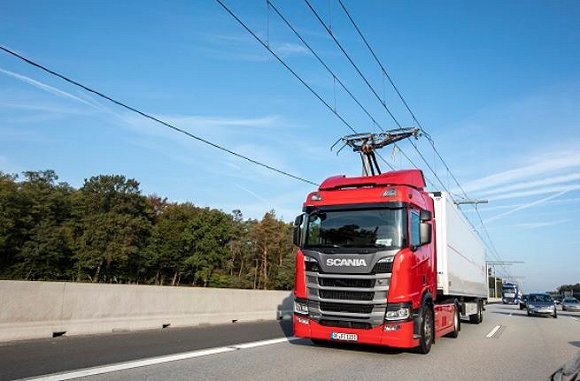The consortium has proposed an ‘electric road system’, using the Siemens Mobility ‘eHighway’ technology, as the fastest, lowest carbon and most cost-effective route to decarbonising our road freight industry and delivering cleaner air.
It includes Siemens Mobility, Scania, The Centre for Sustainable Road Freight (Cambridge University and Heriot-Watt University), ARUP, Milne Research, SPL Powerlines, CI Planning, BOX ENERGI and Possible.
The study is part of the £20m put aside for zero emission road freight trials under the recently announced Transport Decarbonisation Plan (TDP).
The nine-month study kicks off this month and is hoped to be the forerunner of a scheme that aims to see the UK’s major roads served by overhead lines by the 2030s.
The trucks come equipped with a battery that charges while they are in motion so they can detach to both overtake vehicles and reach their destination with zero emissions from start to finish.
The project will look at electrifying at least 30km (19 miles) of the M180 as the pilot, linking Immingham Port with the logistics hubs of Doncaster and its airport.
A fully operational electric road system across the UK would be expected to create tens of thousands of jobs across a range of green industries, with around 200,000 new electric trucks needing to be built over a 10–15-year period.
This will also provide an opportunity to completely revamp the UK truck manufacturing industry and its supply chains, futureproofing it by accelerating fleet digitalisation; a key lesson learned across the industry as it recovers from the 2020 pandemic’s disruption.
Research by the consortium has even found that initial investments into new vehicles by operators could be recouped within 18 months, due to lower energy costs, and the electrification infrastructure would pay back investors in 15 years.
Greener and more efficient roads
Costain’s Sue Kershaw, managing director of transportation, said: “This study is another important step towards understanding how industry could work together to tackle one of the largest carbon emission producers in the country and create a cleaner, greener and more efficient road freight network across the UK.
“Bringing our heritage in complex programme delivery and expertise in integrating technology to this consortium is part of our Climate Change Action Plan to implement change and create a green transport future through collaboration.”
William Wilson, CEO of Siemens Mobility Limited, said: “Investing in proven technologies like eHighways can help us go further and faster to decarbonise the UK’s transport network, and support jobs and growth to level up the country.
“By building on successful trials from other countries like Germany, our ERS consortium M180 trial will help the UK move a step closer to replacing more polluting trucks with clean, efficient electric HGVs.”
Professor David Cebon, director of the Centre for Sustainable Road Freight (Cambridge University and Heriot-Watt University), added: “Our previous research says that overhead catenary power will provide the lowest cost, lowest carbon, and most rapidly deployable solution to decarbonise long-haul road freight in the UK.
“This project will test the concept at the next level of detail. Moreover, the technologies this consortium is working on could be deployed in most countries once demonstrated, supporting the global move towards greener logistics.”
Read more here





